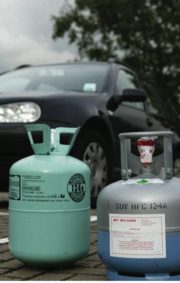BOC urges air-conditioning contractors to plan for ban on disposable cylinders

Non-disposable cylinders for refrigerants will soon be the only ones on site as the EU campaign to reduce the leakage of global-warming gases moves towards a ban on disposable cylinders.
Ahead of a Europe-wide ban on the use of disposable cylinders for topping up air-conditioning systems, refrigerant supplier BOC is urging maintenance companies to change the cylinders they use. The ban affects gases that contribute to global warming, including refrigerants R134a, R404A, R407C and R410A. Thousands of contractors and maintenance engineers in the UK rely on refrigerants supplied in portable 13 kg cylinders to restore air-conditioning units. Discarding of near-empty cylinders into landfills has led to 80 t of residual gases leaking into the atmosphere every year, according to DEFRA. From July 2007, refrigerants need to be sourced in non-disposable cylinders, with disposable returned to the sender for the gas to be recycled or disposed of legally. Barry Lyons, refrigerants business development manager with BOC, says, ‘We know that major refrigeration companies servicing the sector are preparing for the changeover, but it is clear that independent contractors and many of those responsible for building maintenance are unaware the regulation exists, let alone what effect it will have on their business or customers.’ From next July, refrigerant gas will be available only in non-disposable compressed gas cylinders from an accredited gas supplier. In the lead up to the changeover, BOC is advising its customers to ensure they have access to a secure supply of non-disposable cylinders, phase-in non-disposable cylinders by running down their supply of disposables and ensuring that staff have been trained in safety with compressed gases.
Related links:


